Guilty or Innocent, the Public Can’t Get Enough of Courtroom Fashion During Celebrity Trials
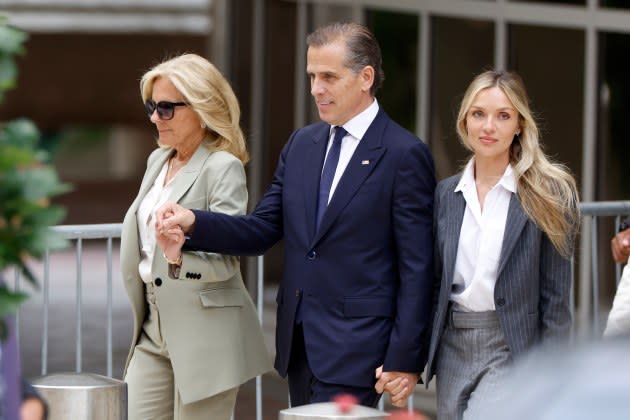
In all criminal cases, defendants have the constitutional right to a jury of their peers at trial. But as recent high-profile cases have proven, when it comes to what they — or pretty much anyone else in the courtroom — wears, nearly every onlooker, news junkie or follower has an opinion.
The public’s interest in Donald Trump’s and Hunter Biden’s cases extends beyond the charges and convictions with many commenting on and critiquing not just their mannerisms and expressions, but their suits, shirts and ties. The fashion choices of their witnesses, relatives and supporters are scrutinized too. Gwyneth Paltrow ramped up interest in the undercurrent of courtroom fashion by dressing in a low-key style to testify in her Utah trial last year. But the consumers’ and jurors’ fascination with who wears what is not a new phenomenon. Even in 1893, when Lizzie Borden was tried for the ax murder of her father and stepmother, fashion was referenced in the news coverage.
More from WWD
Michael Kors Is Mastercard's First AI-powered Shopping Assistant Retail Partner
How Chloé Helped Bring Alive the Costumes for 'Becoming Karl Lagerfeld'
Attorney and TV analyst Lisa Bloom said some clients send potential outfits for approval. “What people wear to court has always been important, because first impressions are important. And in court, there is a lot of sitting around and staring at each other. What is there to do, but look at what people are wearing and try to interpret it?”
Bloom’s fashion advice to all clients is to dress very conservatively, nothing distracting — white shirt with a black or gray jacket — minimal jewelry and cover any tattoos. “I’ve got nothing against tattoos — I’ve got one myself. We just don’t want people puzzling out what your tattoo is instead of listening to your testimony,” she said. “Conservative hair, conservative makeup — it does matter.”
She added, “If you’re just attending court, sitting in the gallery as a family member or community activist to wear a color [in solidarity] to make a public statement, that’s fine. No one can stop you. If a group of people are sitting together wearing pink, that might send a message, And people have a First Amendment right to do that, as long as they’re not disrupting the court. That’s a completely different standard, and I think people should just go for it.”
As for the general interest beyond the courthouses, Bloom said, “It’s a lot easier to think about what somebody’s wearing than the legal complexities.”
For Biden’s trial in Delaware, pantsuits were the preferred look worn by his wife Melissa Cohen Biden, his sister Ashley and First Lady Jill Biden. Such first-job-interview clothing is no longer standard attire in ultra dressed-down America, and definitely not in the spring; those conservative, buttoned-up choices presented a united front to some onlookers. Cohen Biden’s businesslike look, which included a pussy-bow blouse one day, drew comparisons by the media to former FLOTUS Melania Trump (who has yet to make a court appearance with her husband at any of his legal proceedings.)
Trump’s stylist Herve Pierre declined to comment about the comparison. Wherever one stands, or sits, courtroom fashion is increasingly resonating as proven by the reporters’ coverage of the business casual choices worn at Trump’s hush money trial by his accuser Stormy Daniels. After Trump was found guilty of 34 counts of falsifying business records, the influencer and activist Emily Ratajkowski was photographed wearing a T-shirt with a drawing of Daniels by the artist R. Crumb that she had been gifted. Hundreds of the $95 item sold right away and sales were flooding in through the weekend, according to Richard Thayer, chief operating officer of the e-commerce site Platform.
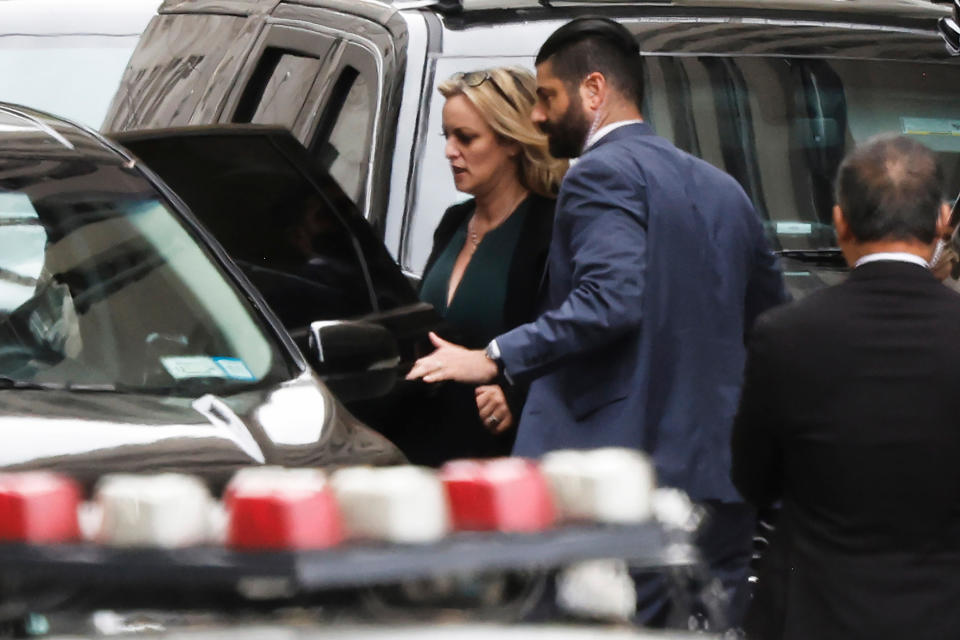
The former president’s lead attorney for the Daniels case, Alina Habba, also grasps the power of fashion, having once worked at Marc Jacobs. An interview request about that subject was not acknowledged by her firm.
Brooklyn Museum’s senior curator of fashion and material culture Matthew Yokobosky took note when after days of Jill Biden’s supporting her stepson Hunter in the Wilmington courthouse, she turned up in a Daniel Roseberry-designed navy Schiaparelli gown with a white cummerbund and train for a state dinner hosted by French president Emmanuel Macron and his wife Brigitte in Paris. He said, “I posted on my Instagram that I didn’t think that I had ever seen her look so amazing. I felt like she was using fashion as a deflection from the trial.”
But Jill Biden was back in the courtroom — and in a jacket and pants — on Monday and for the jury’s guilty verdict Tuesday. The Fashion Law Institute’s founder Susan Scafidi said, “Courtroom attire has stayed the same, whereas pretty much every other aspect of American life has become more casual. We are the rock that has not yet eroded. In some ways, it is the last bastion of true formality. Even at law firms, doing ordinary work during the day, you can be in business casual clothing. But once you head to court, it is right back to the middle of the 20th century at best.”
In Boston and beyond, thousands have been watching the daily proceedings of the Karen Read second-degree murder trial live with some wearing pink as a sign of their support. Read is accused of hitting her police officer boyfriend John O’Keefe with a SUV and leaving him in the snow to die in 2022. One of her most ardent supporters, Aidan Kearney, a blogger and YouTuber known as “Turtleboy,” is selling “Free Karen Read” tanks, totes, T-shirts, hoodies and fleece jackets for adults and children, as well as for pets. There is also a $30 T-shirt imprinted with key testimony from the trial — a Google search [which includes a typo] for “hos long to die in cold” that was given by Jennifer McCabe, whose name is also featured. Kearney, who is facing witness intimidation charges, is due back in court July 11. He agreed to an interview last month, but never scheduled a time. He has alleged that the state has delayed his case to impede him from covering Read’s trial and impinged on free speech rights.
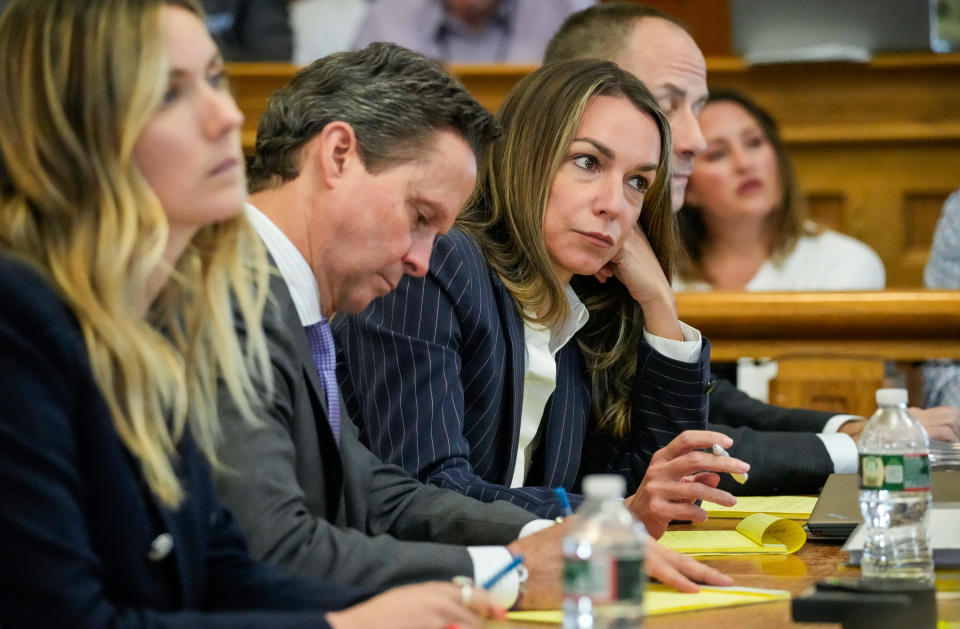
During her ski collision trial last year, Paltrow’s tesimony inspired such apparel as a T-shirt imprinted with “Well, I lost an afternoon of skiing.” Media requests to her lead attorney James Egan of Epperson & Owens were unreturned.
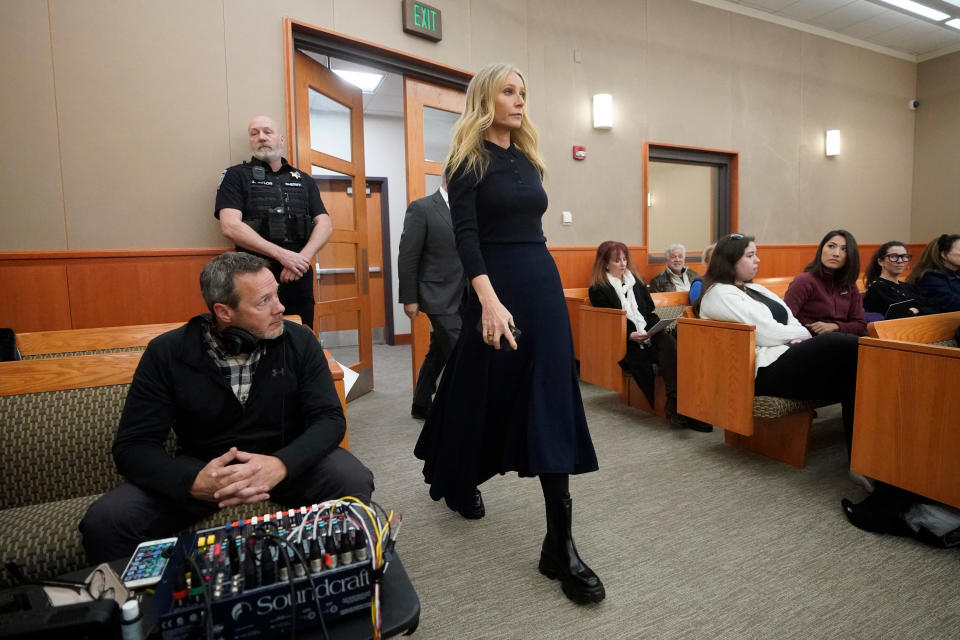
Perhaps more than anything, the “Free Winona” T-shirts that took off in 2002, after Winona Ryder faced shoplifting charges, made real-life celebrity courtroom scenarios more of a pop culture discussion. The fact that Ryder sported one sardonically on the cover of W magazine in the lead-up to her trial only heightened that in-the-knowingness. Last week photographer Michael Thompson recalled how Ryder was “very game and willing to wear the shirt” on the shoot. The $10 “Free Winona” T-shirt’s creator, Bill Wyatt, said, “It was the love for Winona and the irony of her wearing it — the meta effect that propelled it more six months later, when the trial started.” He would know, having sold tens of thousands of the shirts in his Y-Que Trading Post store in Los Angeles, and he said they still sell today (along with “Trump Guilty ones.”) The Ryder windfall saved Wyatt’s then-struggling store, led to online sales and wholesale.
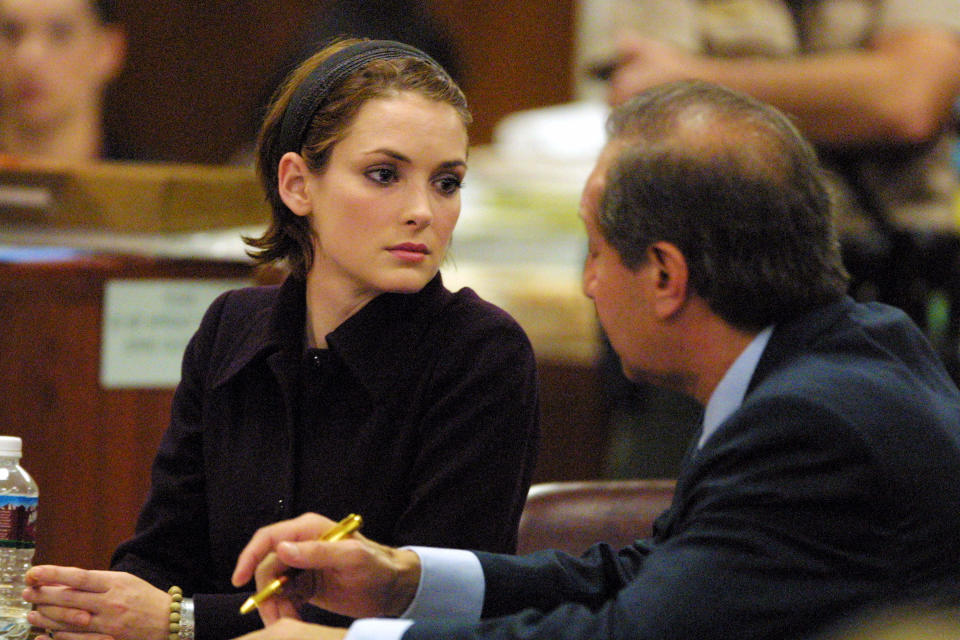
Recalling how the media chronicled Ryder’s toned-down Marc Jacobs outfits including blouses with Peter Pan collars during her trial, Wyatt said trial-bound celebrities know that TMZ and other media will be waiting for their arrivals “because they need content. So celebrities make it like they are walking on a red carpet at the Oscars,” Wyatt said. “It’s a great way to take advantage of that negative attention.”
He noted how Trump and some of his male lawyers sometimes wore blue neckties during last month’s trial even though red is “typically their power move for the Republican side.”
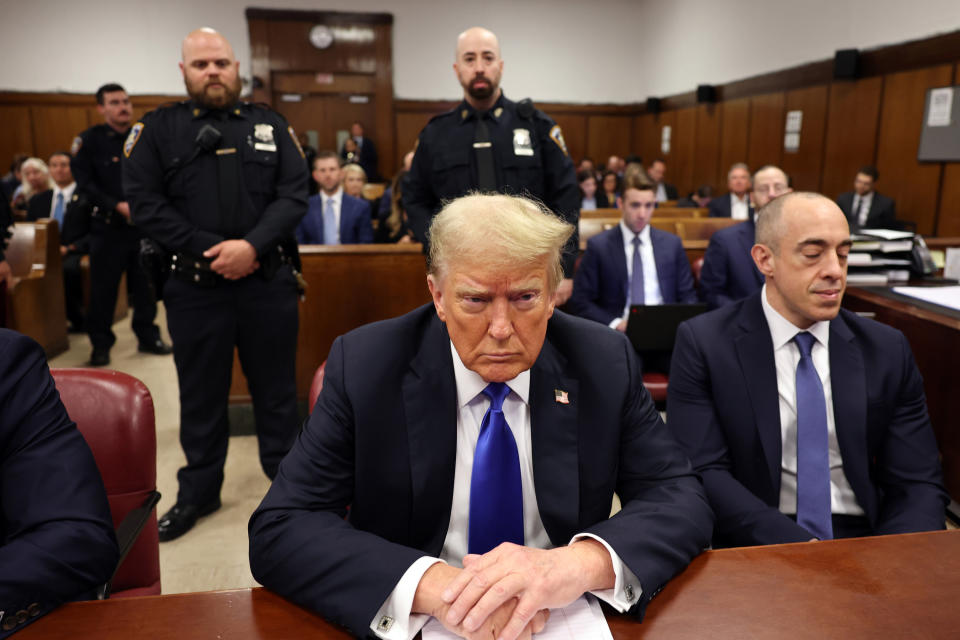
The designer-minded convicted felon Anna Delvey, who posed as a German heiress to scam more than $275,000 in white-chip indulgences, used a court appearance last week in downtown Manhattan to debut a collaborative Shao New York design that is available for pre-order and a Swarovski-encrusted “A” ankle bracelet, as in “Anna,” “ankle” and “The Scarlet Letter.” Still under house arrest for her immigration status, Delvey said, “It’s always fascinating to see what types of messages people are trying to communicate in court appearances.”
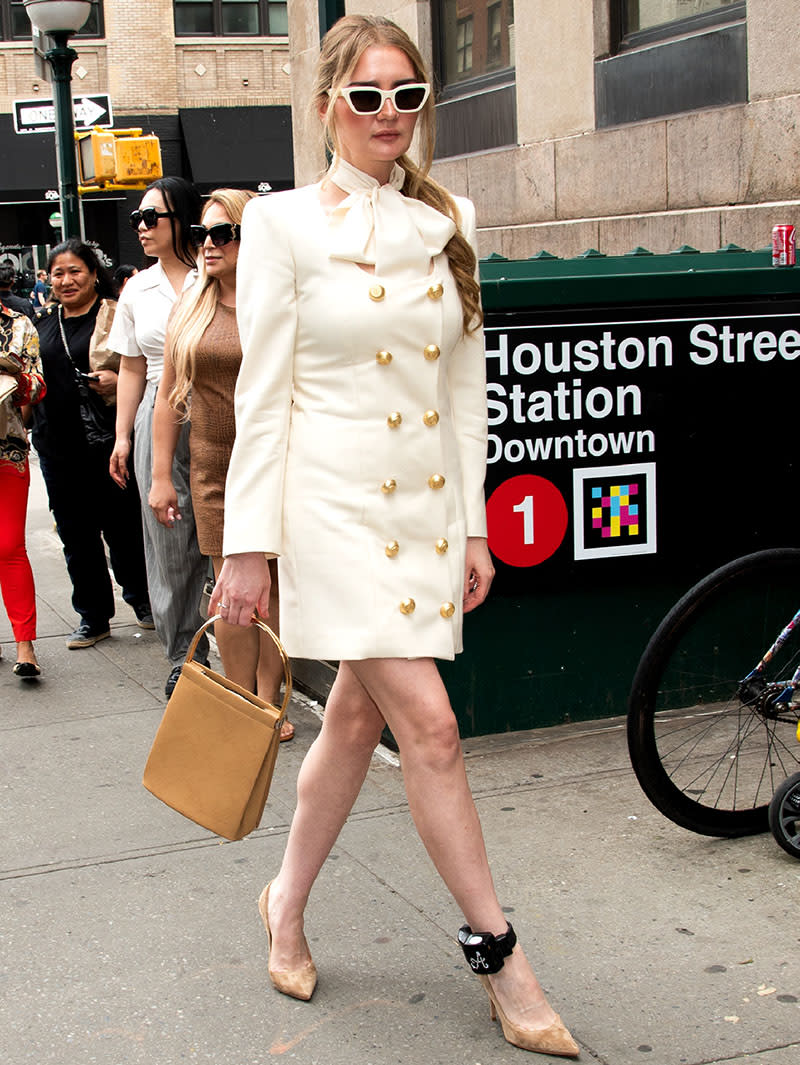
In New York state, the incarcerated can wear civilian attire for court appearance so Delvey sported looks from Michael Kors, Victoria Beckham, Yves Saint Laurent, Zara and other high and low labels thanks to the stylist Anastasia Walker. The logistics of those daily drop-offs at Rikers Island took some coordinating, according to Delvey, who said the stylist approach was “more budget friendly.” She said, “You wear it and return it. People were so outraged by me working with a stylist. If I had bought the clothes, it would have been 100 times more expensive.”
She added, “You have so little control over anything, when you’re in jail or on trial. Your [court] appearance is the only thing that you can control. There are so many photographers there and they can take pictures of you all day in court. It’s pretty intense to be on alert all day. Knowing that with the Internet, those pictures are never going away, I don’t think that I should be viewed as this shallow person, who only cares about the way she looks.”
Best of WWD
